11 Steps to Prepare for Full Time RV Living for Beginners
As an Amazon Associate, we earn from qualifying purchases. We also earn from other affiliate websites. See our full disclaimer.
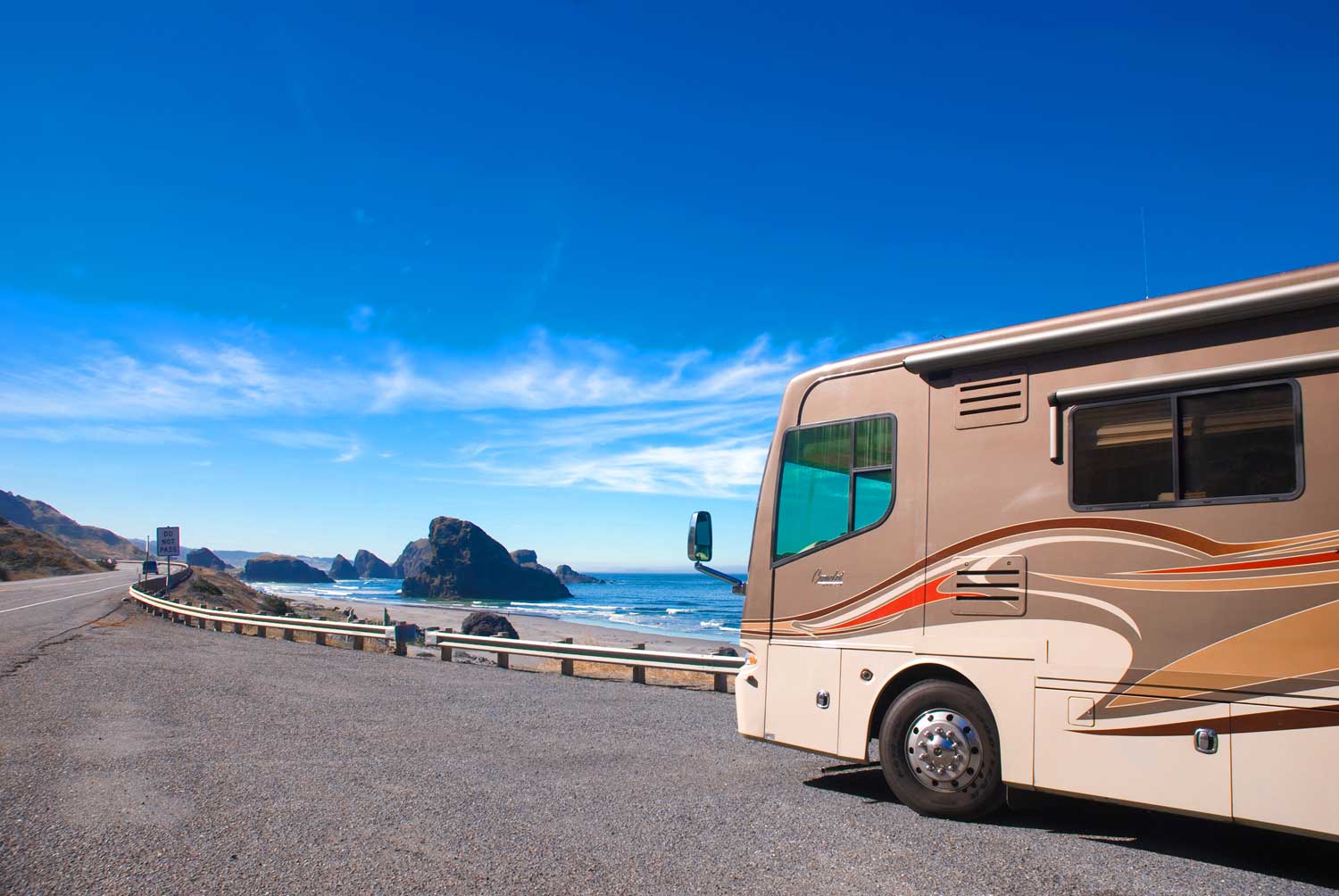
Are you considering living full-time in your RV? Even if you’re exploring the option, we’re here to tell you more about the lifestyle and what you need to know if you decide to live on the road.
There’s no doubt there are challenges in RV living, but you’ll also reap some pretty big rewards living this lifestyle.
From the logistics of living a nomadic lifestyle to what you need to know about choosing an RV to match your travel style – below are the steps to consider and your guide on how to prepare for full-time RV living for beginners.
1. Research & Choose an RV
If you are new to RVing, or even if you’ve done some RV camping, you’ll still need to do extensive research.
When we started our RVing journey, we had almost no experience camping in an RV, let alone living in one. YouTube videos, blogs, Instagram, and Facebook groups are all great ways to learn more about the lifestyle.
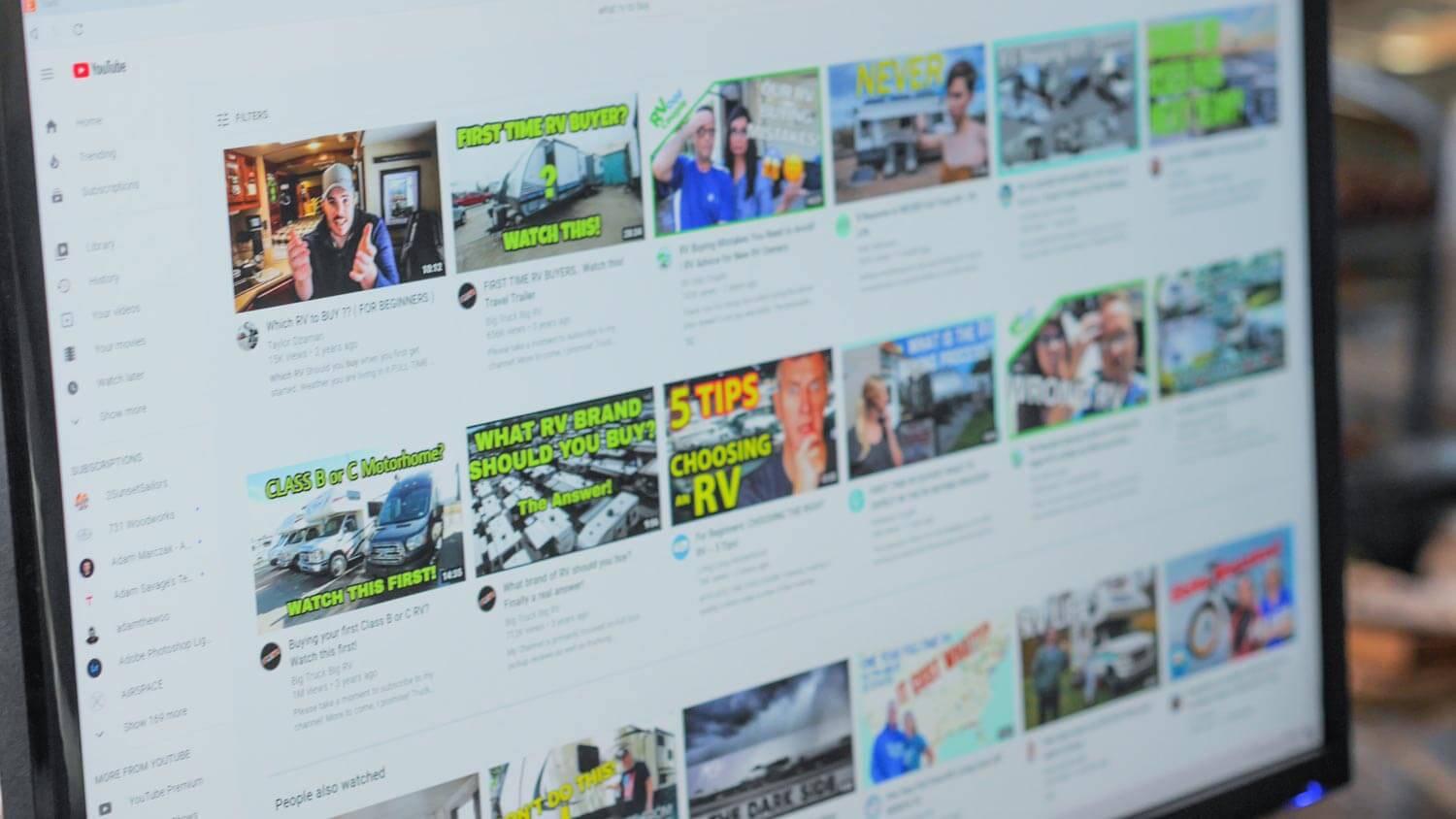
When you get ready to buy the perfect RV, you’ll need to be able to answer the below questions.
- What type of RV do you want? (Fifth wheel, motorhome, travel trailer, camper van, etc.)
- How big (long) of an RV do you want?
- What type of floor plan to you want (rear kitchen, bunkhouse, walk-around bed, etc.)
- What type of features do you want? (Slideouts, solar panels, queen bed, etc.)
To determine the answer to the above questions, you’ll need to establish how you want to travel and camp. Below are three different types of camping styles, but lots of RVers do a combination of these.
1. Boondocking and enjoying free camping on BLM (Bureau of Land Management) land, living off-grid, and managing your power, fresh water, and RV holding tanks?
2. Camping at national parks, national forests, or state parks where you can choose to have RV hookups and amenities or dry camp (camping with no hookups) inside the park?
3. Camping in RV resorts or private campgrounds where you can typically opt for full hookups (power, water, and sewer) and enjoy tons of campground amenities?
You’ll also want to consider if you want to be able to pick up and go quickly or stay in one spot for weeks at a time. You may even want to be a more stationary RV that stays in one spot for a season or more.
Different types of RVs are better for specific types of camping, but you can also outfit each type of RV for your camping style. The key is determining what the most important things are for you and your RV travel companions.
If you’re having trouble answering the above questions, the best way to start is to rent a few RVs and see firsthand the advantages and challenges of various RV types.
Outdoorsy is a great resource for new RVers who would like to rent RVs from private owners. This will give you a chance to get your feet wet and see what your priorities are when it comes to buying an RV.
Spend time researching online and getting firsthand experience by taking an RV trip. With these resources, you can narrow down the RV you need for full-time living.
READ NEXT: To learn more about picking the right RV, check out How to Choose the Best RV to Live in Full-Time and Motorhomes vs Travel Trailers: Which RV is Best for You?
2. Start to Downsize for RV Living
Downsizing your stuff is one of the biggest challenges of moving to a life on the road. Depending on your current living situation, it could even be your most significant roadblock to RV living full-time.

With the right attitude, organization, and a lot of motivation – you can downsize from your home to an RV. Here are a few things to help you get started when the process might seem overwhelming.
- MAKE A LIST OF YOUR BELONGINGS. One of the reasons I felt overwhelmed when I started downsizing was I didn’t know what I had. As a first step, start making a list of everything you have. Then you can start to organize what to keep, what to get rid of, where to sell things, and decide if you need a storage unit.
- START MOVING TO DIGITAL. Clear out books, movies, and music, and declutter paper by moving to digital versions. Save movies or music you can’t get digitally using a cloud service. Scan paper copies using your phone and file digitally in an app like OneNote or Evernote.
- SET GOALS. Set aside time each week to downsize. Make a list of tasks – clean out the linen closet, declutter a kitchen drawer, etc. Set a goal to complete at least one task each week. Additionally, set a goal to sell or donate a certain number of items each week.
- STOP BUYING THINGS. Not only do you need to get rid of stuff, but you need to stop bringing new things into your home as well. Start with a 30-day shopping ban where you don’t buy anything unless it’s a necessity. During that time, create a review process for purchasing items in the future.
READ NEXT: For more tips on downsizing for full-time RVing, check out How to Declutter and Downsize Your Stuff.
3. Find a Way to Work Remotely from Your RV
How you’ll make money on the road can be a significant issue when preparing for RV life. Especially for those in their prime earning years, creating a consistent income stream while balancing an RV lifestyle can have a learning curve.

Here are three strategies for making money remotely and a few tips for each.
Employment
If you’re currently employed in a remote job, you may already be well on your way to taking your home on the road. If your job doesn’t have a remote option, but your skills can be used in location-neutral work, you can transition to a remote role with another company.
- Research websites that specialize in remote work job listings. Even though it is a paid service, we like FlexJobs for finding quality remote and flexible job opportunities.
- Consider the flexibility and resource requirements for your remote job. Does it require you to be available at specific times, five days a week? Will you need a strong internet signal during that time? Will you need to travel often for work? The answers to these questions will impact where, when, and how you travel in your RV.
Starting a Business
Starting a business can be appealing to those seeking an RV life. Flexibility and control are undoubtedly what draw people into an entrepreneurial option. Of course, starting a business from scratch is no easy feat. Here are a couple of tips for planning your transition.
- Launch and establish your business before you get on the road. Transitioning to RV living will require so much of your time and energy. It will be nearly impossible to devote that same needed attention to starting a business.
- Be prepared to find a life/work balance. Running a business allows flexibility, but it also creates a position of constant availability. This is especially true in a small space where your office easily bleeds into your living environment.
Passive Income
Another popular option for income on the road is to develop passive income streams. Passive income is usually a form of income that requires resources upfront (time, money, etc.) and continues to earn revenue with significantly fewer resources going forward.
- A real estate portfolio, dividends, and profits from selling stock photos or licensing music are just a few examples of passive income. These assets can become substantial contributors to your monthly earnings.
- Similar to starting a business, passive income takes time to build. However, if you choose this route, it can offer the most flexibility for a life of travel.
Workamping
Although not remote, workamping jobs are popular among full-time RVers who want to make a little extra money on the road or save money on campsites. Workamping is when campers exchange work hours at a campground for a campsite (or campsite and hourly pay).
These jobs are usually seasonal, allowing RVers to make or save money for a few months and then head back out on the road!
How Do Other RVers Work While Living in an RV?
Learn more from the below articles.
- 21 Unique Jobs for Full-Time RVers – Adventures with Tucknae shares quotes from real-life RVers on how they make money
- Working Remotely As A Full-Time RVer: Advice From RVing Remote Workers – Xscapers profiles RVers on their remote work lifestyles
4. Get Internet and Stay Connected in an RV
Internet is a challenge in RV living since the most reliable service will vary by the campsite.
Although not as big of a challenge as five years ago, getting a wireless internet connection requires the right cellular plans and hardware to meet your needs.

Your structure for getting internet might include one or more of the below.
- mobile phone plan
- hotspot plan
- Satellite internet plan
- data extender
- WiFi extender
- mobile internet router (for example, Pepwave or Insty Connect)
Many people who live a mobile lifestyle don’t rely on one connection alone. If you work on the road, you will want various options for getting online and even a couple of different cell carrier plans (one for your cell phone and another for your hot spot).
Be aware that most RV resort WiFi is either slow or not accessible from all the resort’s RV spots. Having a WiFi extender or an option to use a cellular plan can be a necessity depending on your need for internet access.
Check out this article from Stairs Up – Handle In on Staying Connected on the Road.
5. Mail Forwarding for RVers
Living a life on the road can bring about some logistical complications. This is especially true if you are planning to sell your sticks-and-bricks home.
Something as simple as receiving mail can get complicated quickly when considering traveling full-time. Luckily, there are a few options that have been springing up for RVers and other travelers.

- My RV Mail provides you with a Florida address and offers an app to manage your mail – scans, forwarding, shredding, etc. They also offer check depositing services. Their monthly plans start at $9.
- Traveling Mailbox offers similar services as My RV Mail but has more states for address options. Their monthly plans start at $15.
- Escapees RV Club offers mail forwarding with their membership and provides you with a Texas, Florida, or South Dakota address.
Another change you’ll want to start making is to receive as much important information digitally as possible. You can manage and pay regular bills such as cell phones, insurance, and credit cards online.
In our years of full-time travel, there have only been a few things we really needed that have come in the mail.
If you are like us, you might consider using a trusted friend or family member’s address. As long as they agree to it and you don’t require constant mail forwarding, it can be a good option to save money and chat with your family once a month.
6. Health Insurance for RVers
Health insurance is a huge topic in the U.S. traveling community. Many full-timers (including us) previously relied on employer benefits for health insurance. That makes healthcare an unfamiliar area to a lot of us.

To get started, you’ll want to consider your health insurance choices based on the below.
- YOUR HOME BASE – Whether or not you have one might sway your decision and impact where you can shop. Many insurance plans, including the Healthcare Marketplace, won’t provide coverage outside of your home state.
- YOUR CURRENT HEALTH – This can be a huge factor. If you are in your 20s and healthy, you may not even want major medical coverage (what we usually refer to as traditional health insurance) and can opt for basic coverage.
- YOUR ABILITY TO SELF-INSURE – After searching the current insurance market, many folks choose to self-insure. You can also do this as a part of your overall health insurance strategy. If you’re financially able to set aside money to be used for your healthcare needs, it could prove a good option in combination with a less traditional coverage plan.
We’re the Russos has a great article on RV Health Insurance, including what options have and haven’t worked for them. The Wayward Home also has an article that provides an overview of RV Health Insurance and Coverage on the Road.
7. Set Up Your RV
Once you’ve got your RV, take some time to get familiar with it. Read the manual, watch YouTube videos, learn how to use all the features and systems, and practice driving it to get accustomed to driving or towing a large vehicle.
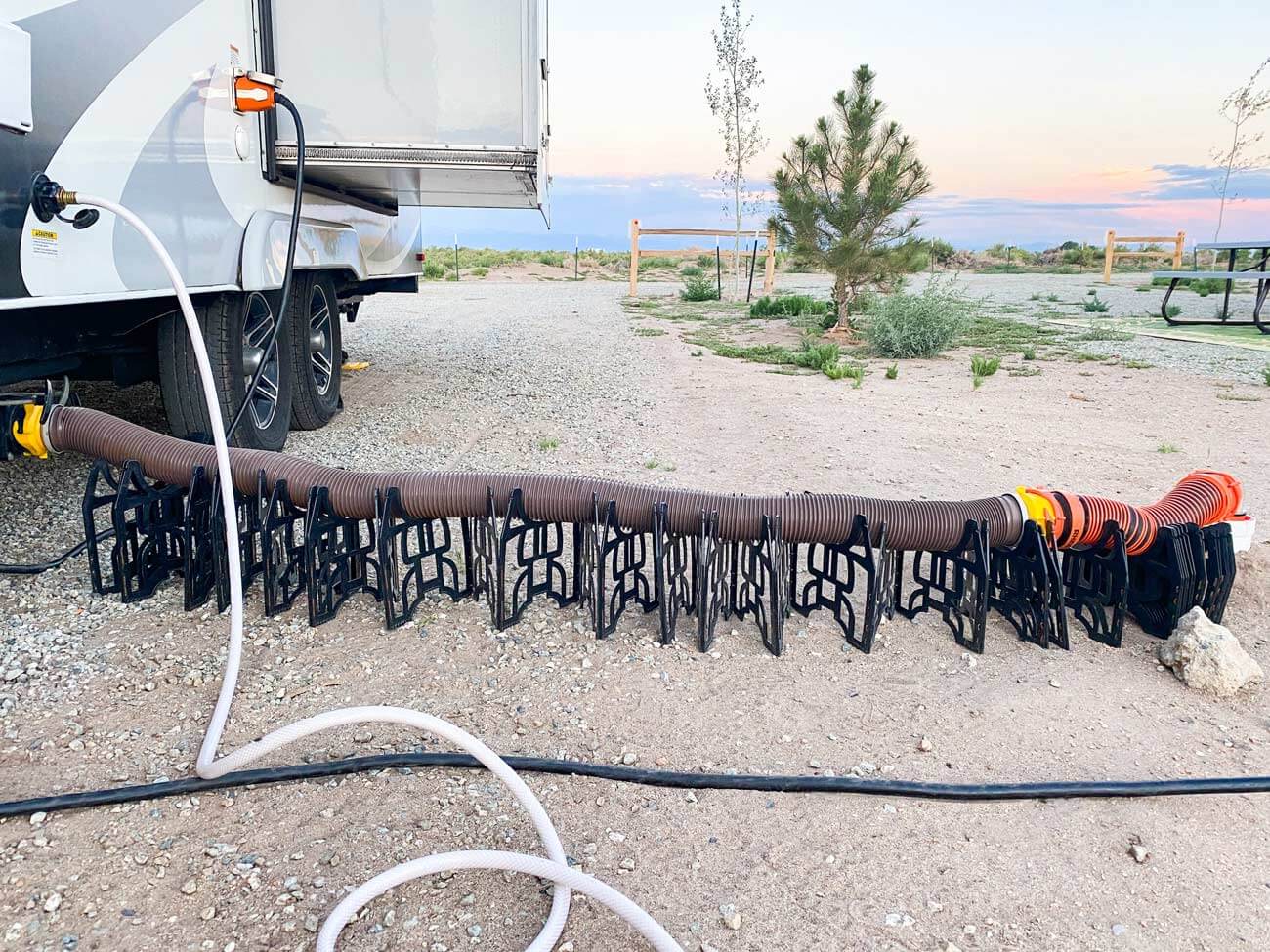
Here are a few other crucial things to note or do to get your RV set up successfully.
KNOW THE WEIGHT OF YOUR CAMPER. A mistake many newbie RVers make is overloading their camper. Some RVs have more storage than can be utilized due to restrictions of the GVWR of the RV. Add in the weight of full RV tanks, and overloading your RV becomes relatively easy.
MAKE SURE YOUR RV IS IN GOOD CONDITION. Before you use the RV, check that everything is in good working order and that regular maintenance has been performed. This includes checking the tires, brakes, and lights, cleaning the tanks, and reviewing other systems and infrastructure.
LEARN HOW TO SET UP YOUR CAMPSITE. Make a checklist of each step to setting up your campsite and follow it each time you arrive at a new campsite. Be sure to take your time on the first few outings until you get accustomed to your setup. Learn more about setting up a towable RV with our Travel Trailer Setup Checklist.
GET THE ESSENTIAL RV GEAR. Before you do anything with your RV, ensure you have all the gear and tools you need for a safe and hassle-free first trip. This includes freshwater hoses and accessories, sewer kits, leveling items, and more. To learn more about gear and RV essentials for beginners, check out RV Must-Haves to Get on the Road Now.
Once your RV is outfitted for your first camping trip, do a trial run by camping for a few nights in a driveway to get the feel of what it’s like living in a small space and using the RV systems. This will also allow you to find any undiscovered issues, and if something goes wrong, you are in a safe and convenient place to handle the situation.
What About RV Gadgets?
In the beginning, you’ll find a lot of recommendations for what you need to make your life easier when you’re RVing. But don’t be tempted to run out and buy all the gadgets just yet. Take your time and figure out what’s worth having (especially if you don’t have much storage space).
You’ll learn quickly how valuable your space is in an RV. Many times the gadgets aren’t worth lugging around, and a simple alternative is better.
8. Mentally Prepare to Tell People About Your RV Life
Yes, planning to RV full-time is super exciting. If you’re like me, once you started planning your escape into a world of traveling, you can’t think about anything else. It’s the best idea you’ve ever had!
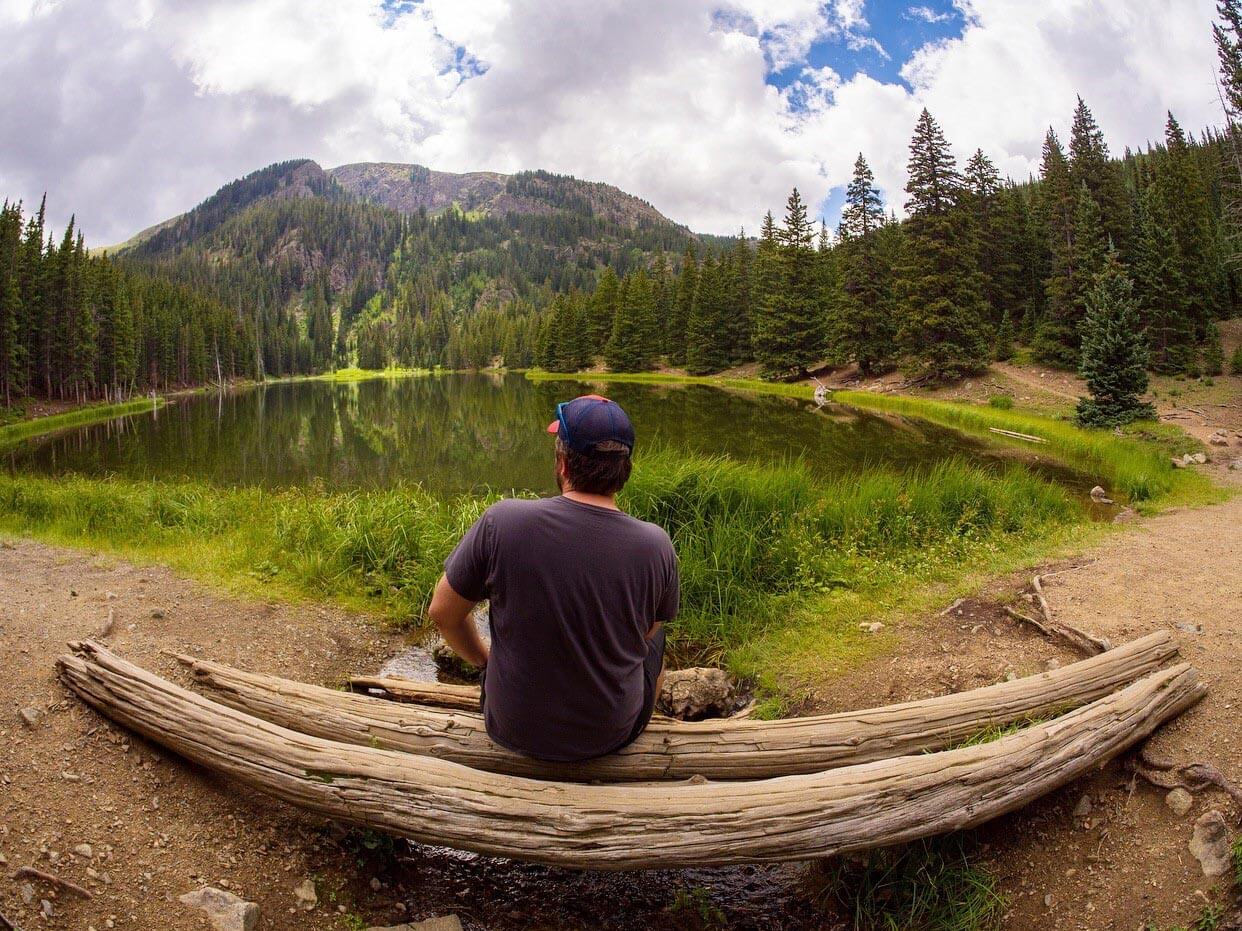
Don’t forget that not everyone will see your leap of faith this way.
Some will be skeptical of this new life you’ve chosen to embark on, and that’s ok. Remember, you don’t need everyone to react with the level of enthusiasm you have for this lifestyle.
Even with the recent migration to full-time RVing, you might find a stigma around this life that it’s a downgrade from a traditional lifestyle. When we shifted into RV (and boat) life, I tried to educate people about this way of living. However, I also accept you can’t convince everyone becoming a full-time RVer can be an enriching experience.
If you are confident in pursuing a full-time RV lifestyle, don’t let people with different goals and passions stray you from yours.
9. Follow the Unwritten Rules of RV Life
There are many ways to live an RV lifestyle. However, there are some unwritten rules that almost all RVers agree will make RV life easier.
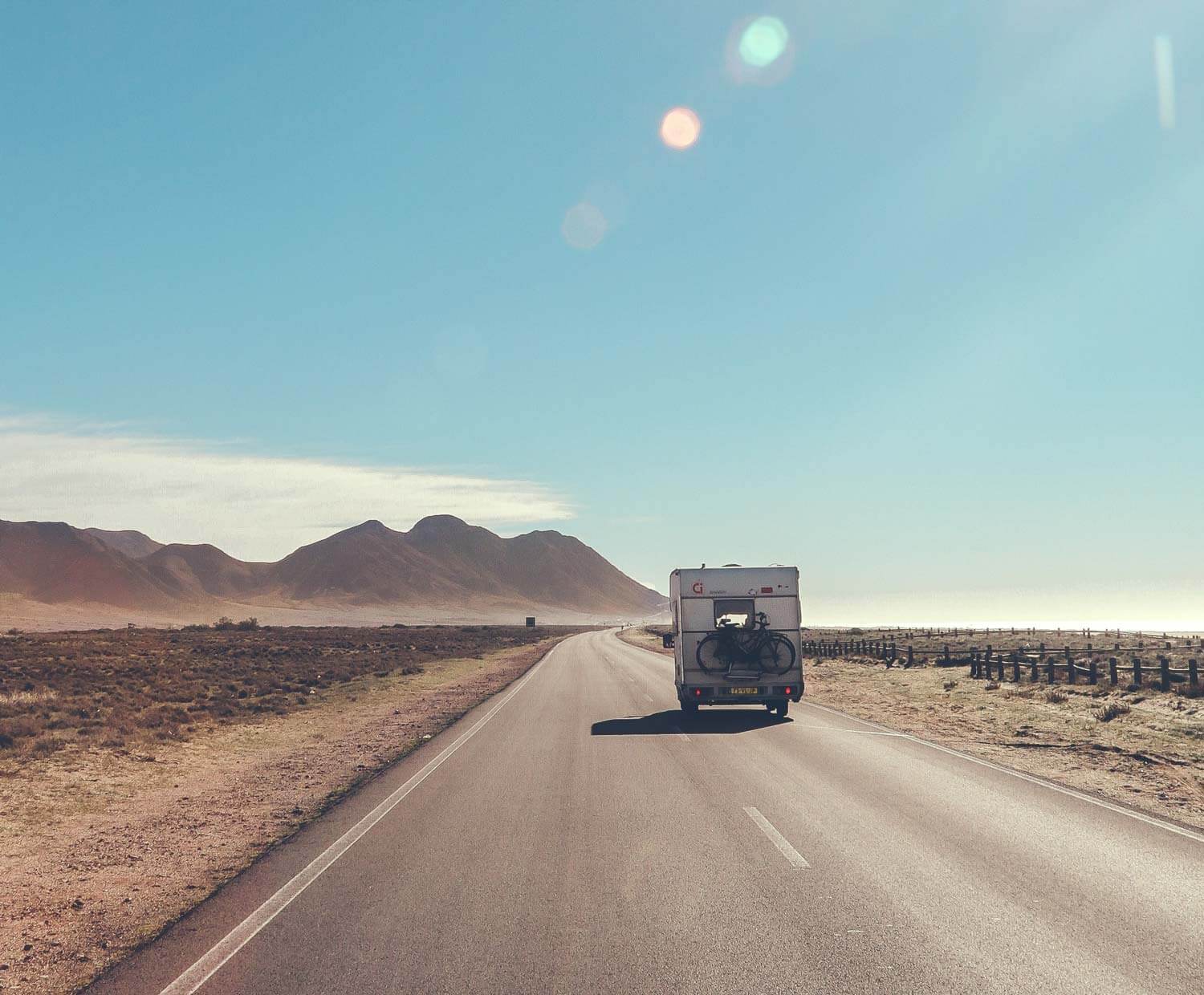
Here are five RV living tips to help you avoid stress and unsafe situations.
SET TRAVEL DAY LIMITS. And stick to them! Whether you follow the 3/3/3 rule or abide by a part of it – set your boundaries for travel days or weeks and plan accordingly. Setting limits will make for safer and more comfortable days on the open road (and if you travel with your partner or family, everyone is less likely to get cranky).
TAKE YOUR TIME. One of the biggest regrets first-time RVers have is trying to see too much in their first year (or season) of travel. Don’t rush from camping spot to camping spot. You’ll get burned out trying to see so much instead of enjoying the places you visit.
REMEMBER, IT’S NOT A VACATION. This lifestyle is not a vacation. There will be errands and chores, similar to a traditional lifestyle. If you work on the road, you may be stuck inside the RV at a computer for multiple days in a row. Set realistic expectations and plan your travel days accordingly.
TAKE A BREAK. If you’re full-time RVing, it’s okay to plan a stay or vacation outside of the RV. Book a trip and stay in hotels, or plan to stay in an Air B&B for a week. Even moochdocking at family or friends’ homes can allow for a break with the luxuries of a traditional bathroom, laundry, a full kitchen, and more.
BE FLEXIBLE. Things will break (your RV and your vehicle), and plans will change. Get in the mindset to go with the flow. Be ready to accept changes when plans fall through or big things break. You’ll get through it. Just take it one day at a time!
10. Choose Your Camping Memberships & Passes
One of the benefits of RV living is that you have access to a variety of camping memberships. These memberships give you discounts on camping stays, so you can save money on your travels. However, not all memberships are created equal. The best camping membership for you will depend on your RV travel style.
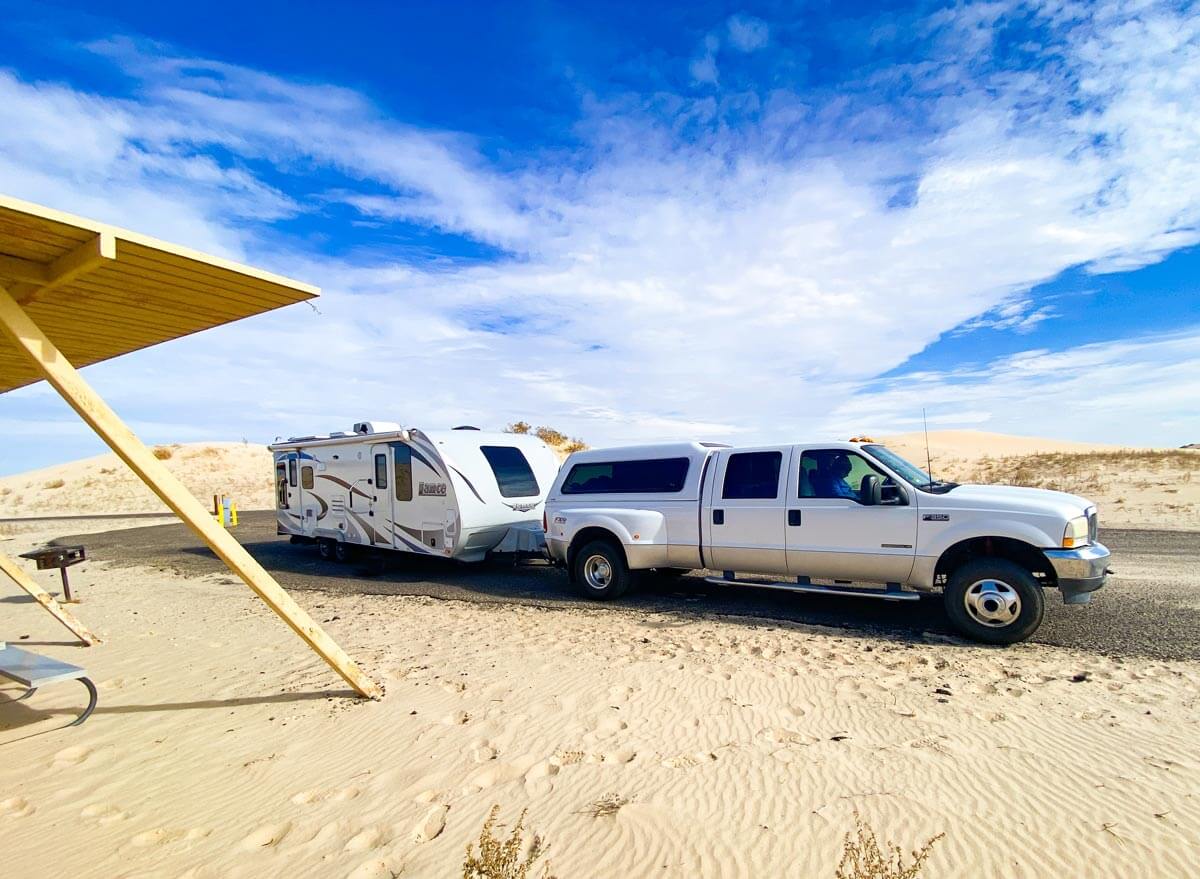
Campground Memberships
If you plan to camp in private campgrounds, look into membership programs that provide discounts to a select group of campgrounds around the country. Passport America or Thousand Trails memberships are popular options.
MORE INFO: Check out our friend Jen Reinhart’s review of the Thousand Trails membership on her website, Stairs Up – Handle In.
State Park Passes
If you enjoy camping in state parks, look into what different states offer for their state park pass. Some states will offer camping discounts or a rewards program. Even if the state park doesn’t offer a camping discount with it’s pass, it will cover the state park entrance fee, which is sometimes charged separately from camping fees depending on the state.
PRO TIP: Some of the best state park passes for camping discounts include New Mexico, Nevada, Texas, Massachusetts, and Georgia.
Also, look for senior, military, and veteran pass discounts, which are often available.
Other Membership Options
Other camping memberships include Harvest Hosts and Boondockers Welcome, which allow you to book overnight stays at private homes or establishments such as breweries, wineries, farms, and more.
No matter what type of camping membership you choose, it’s important to consider where you’ll be camping and do your research. This way, you can find the membership that best meets your camping preferences.
11. RV Responsibly
Lastly, here are a few tips for how to RV while being responsible and respectful of nature, camping areas, and other RVers.
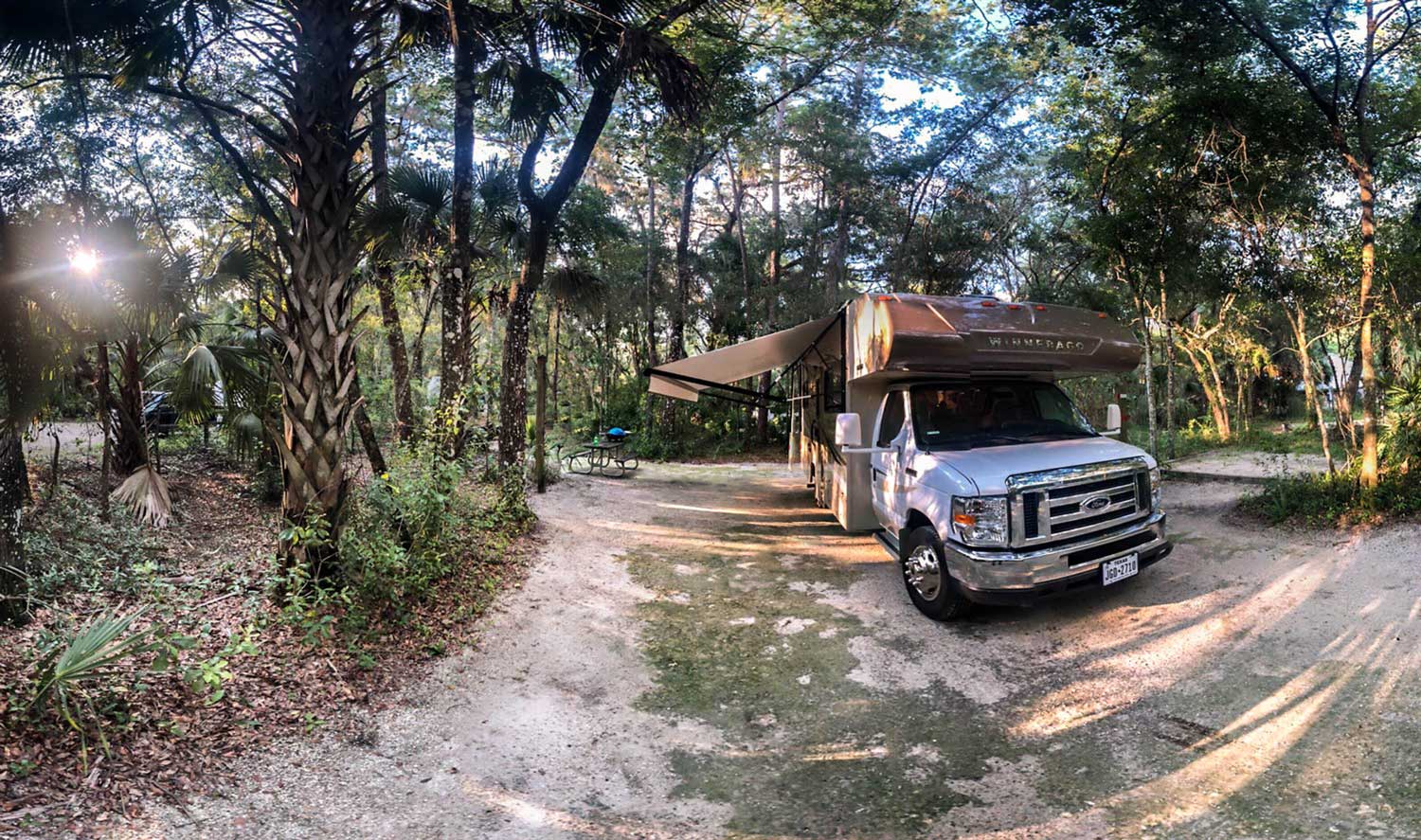
LEAVE NO TRACE. When camping or hiking, practice Leave No Trace principles to help protect the environment. Always leave places cleaner than you found them. If you see trash that’s not yours, clean it up. In a time when the RV community is rapidly growing, this general rule helps keep spaces clean. It also allows RVers to continue enjoying access to public lands.
BE AWARE OF WILDLIFE. When you’re in nature, be aware of the wildlife around you. This includes keeping an eye out for animals, not feeding them, and not approaching them too closely.
BE RESPECTFUL OF OTHERS. When staying in campgrounds or other public areas, respect fellow travelers and follow the area rules. Quiet hours are usually 10pm to 6am but should be posted in the campground. Keep the noise down and the generator off during these hours. If you’re boondocking on public land, follow the usual quiet hours. Don’t park right on top of people. Give campers space when finding a boondocking spot.
BE MINDFUL OF YOUR PETS. When you’re RVing with pets, be sure to clean up after them and keep them under control at all times. This includes not letting them roam free and not leaving them alone in the RV for long periods.
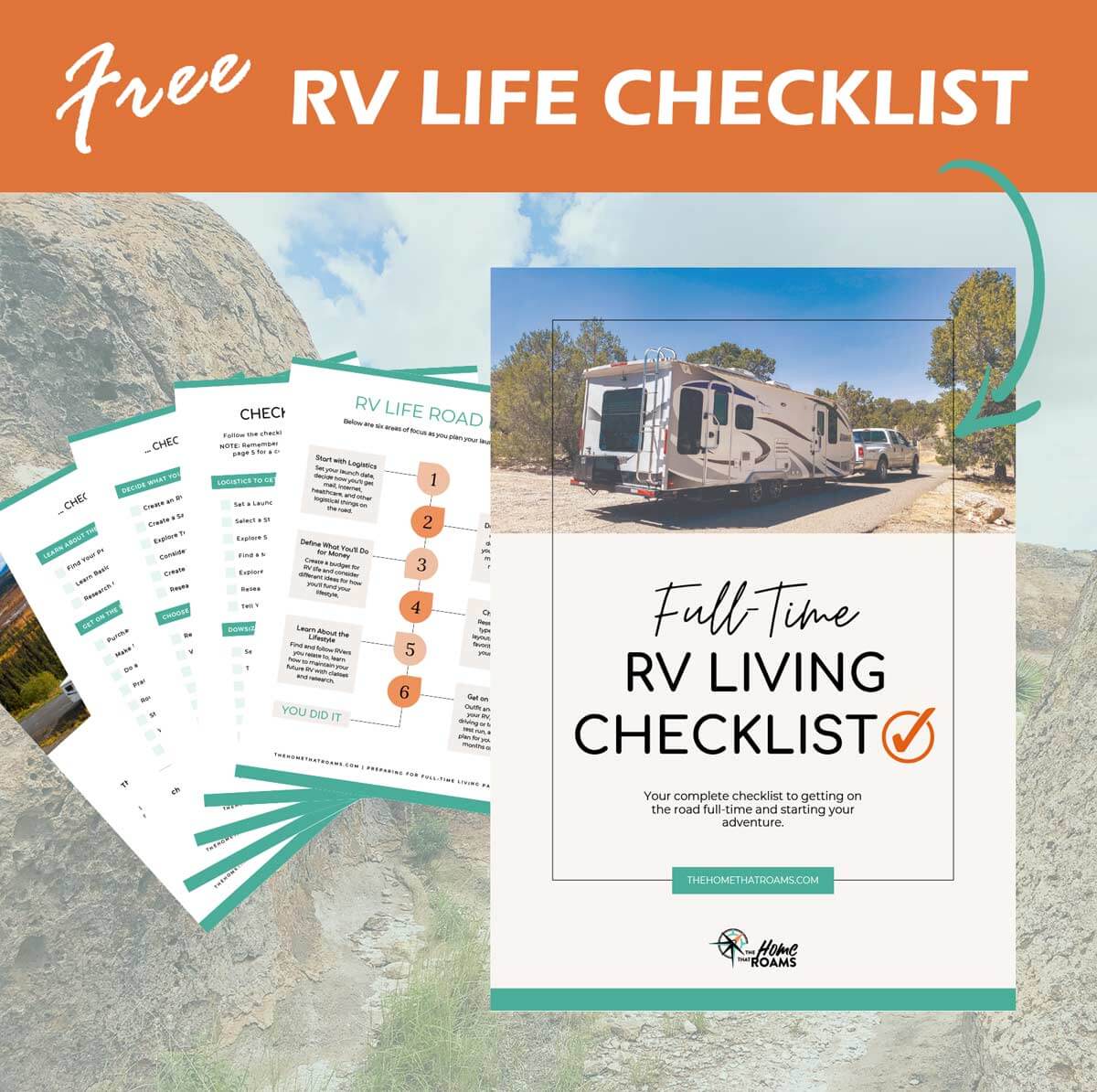
Your Guide to Launching RV Life
Road Map & Checklist – Start Now!
Unsubscribe at any time. View our privacy policy.
Getting Started as an RV Beginner
When you are preparing to live as a full-time RVer, there is so much to learn. I guarantee that at some time in the process, you’ll feel overwhelmed.
Remember, everyone who’s living this lifestyle at some point knew nothing about it. To gain experience, you have to jump in and get a little uncomfortable to start feeling more confident.
We hope you found some helpful RV tips in this article and feel a little more fearless in planning a shift into this fantastic lifestyle.
Want to learn more about how to live in an RV?
For more on the best RV gear, the pros and cons of RVing living, organization, and cooking in your RV – view our complete guide.
Like this post? Save it on Pinterest for later.
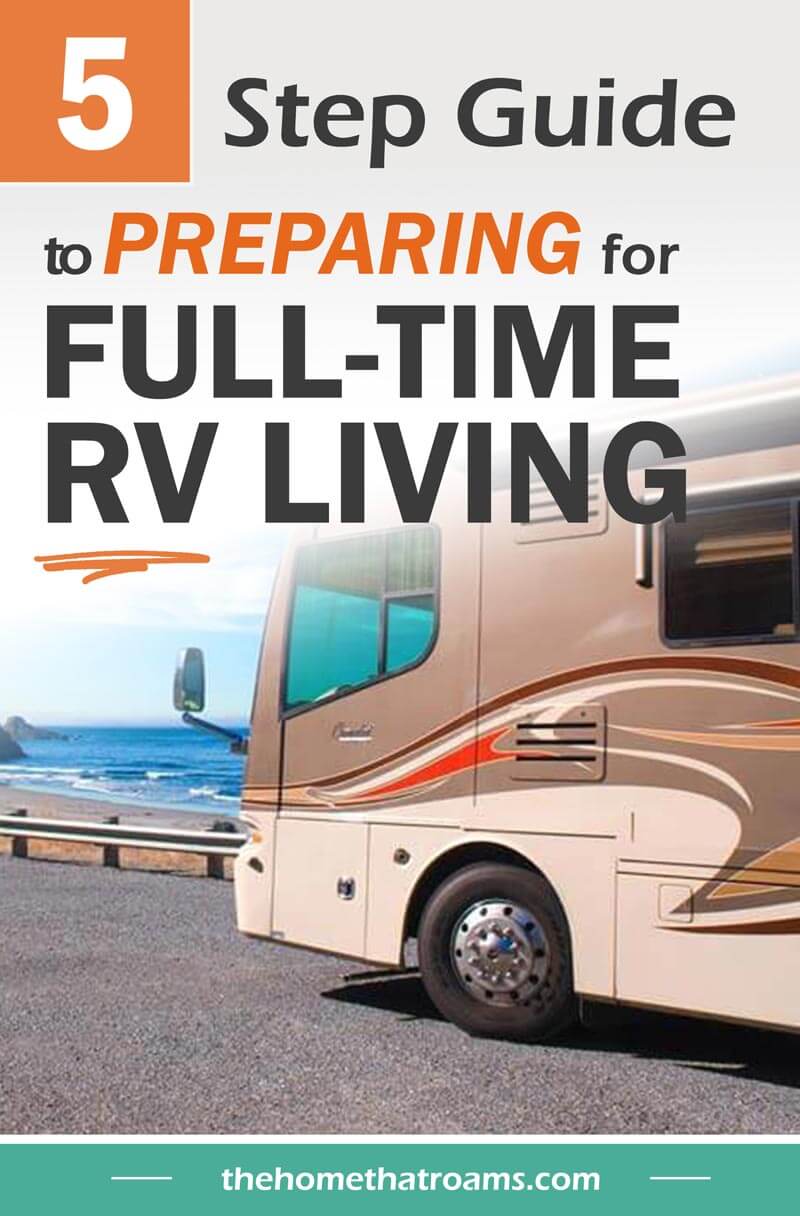
Or view our web story.

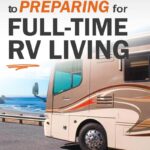
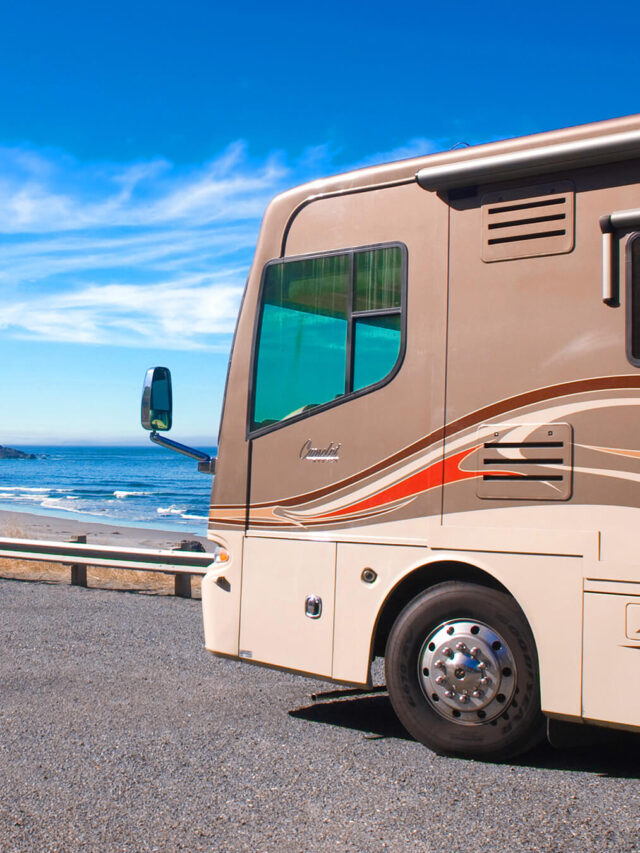

This is such an informative post! You really covered it all and love the links to the Escapees – they have so many resources!
Thanks Jen! And yes – Escapees has so many great benefits!
So much good information for those looking to dive into the RV world!
Thanks Megan! There’s no much to know in the crazy world of RVing!
Wow this is packed full of awesome information Morgan! So helpful!!
Thanks Sammy! I hope it will make it a little less intimidating for folks to start planning for the lifestyle!
Morgan this is SO HELPFUL!! I wish I would’ve had this resource when we first started! Seriously, this was so great and will be so helpful for others! I can’t wait to share!
Thanks so much Jodie! I am hoping it will give new RVers a place to start and be a guide to taking those first difficult steps!
This is such a great post! Loved reading it, thanks for sharing all of this helpful information!
Thanks Janae – so glad you enjoyed reading it!
I am getting ready to RV full time. I have a few questions. I would like to ask, if you don’t mind. Please contact me if your interested in answering my questions. Thanks shana, sshanab1@yahoo.com